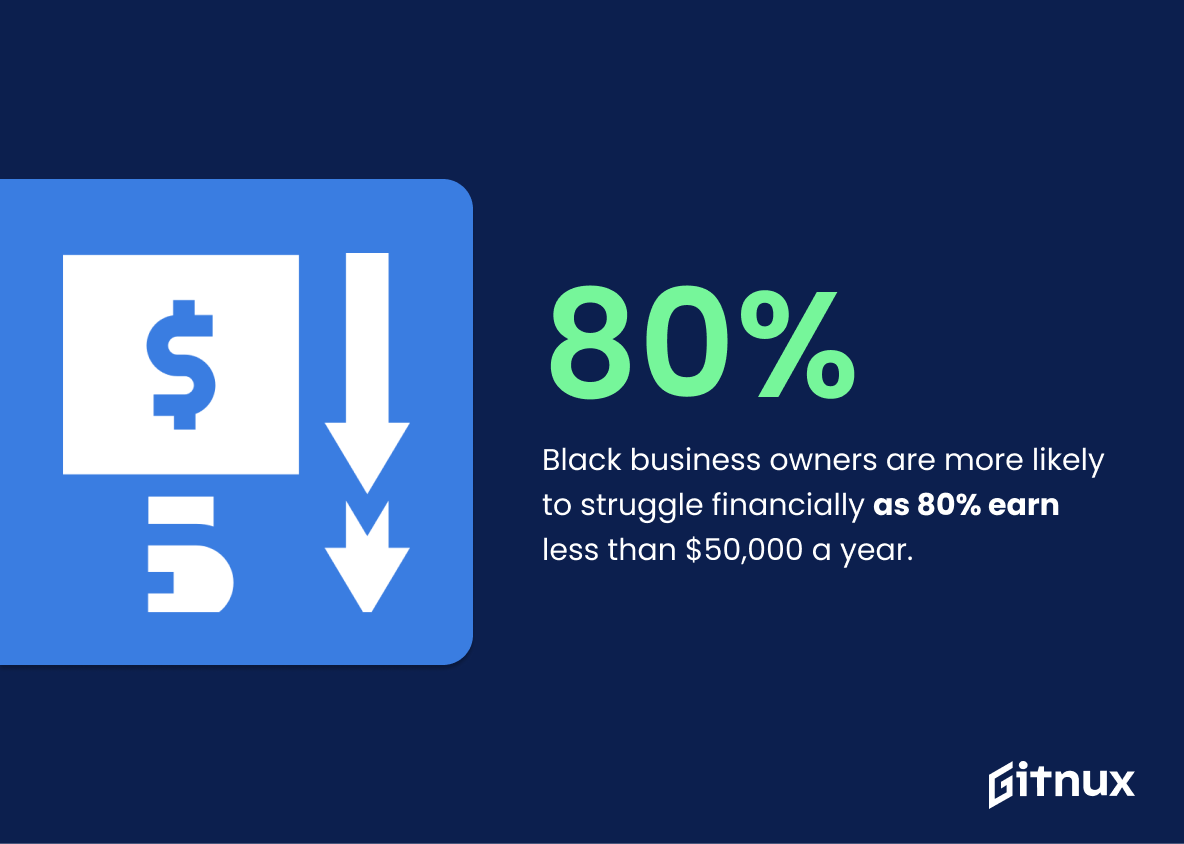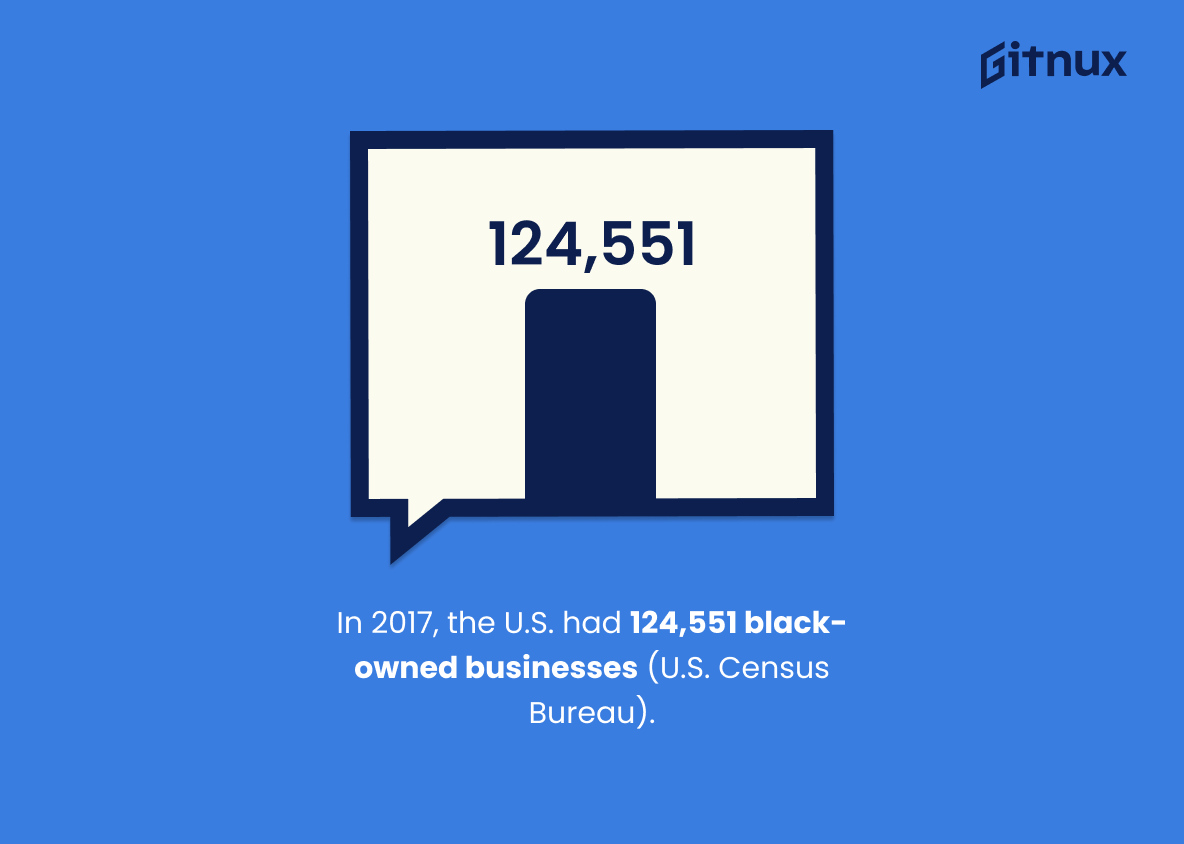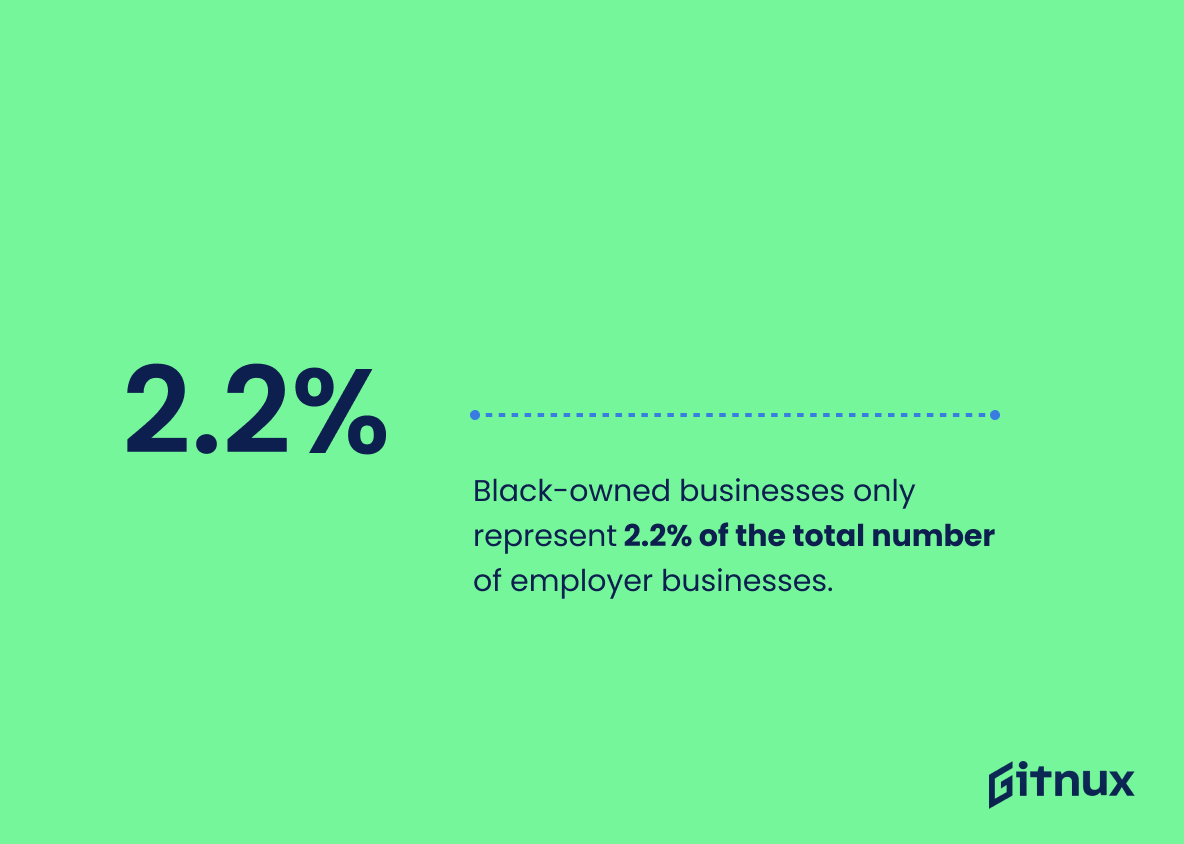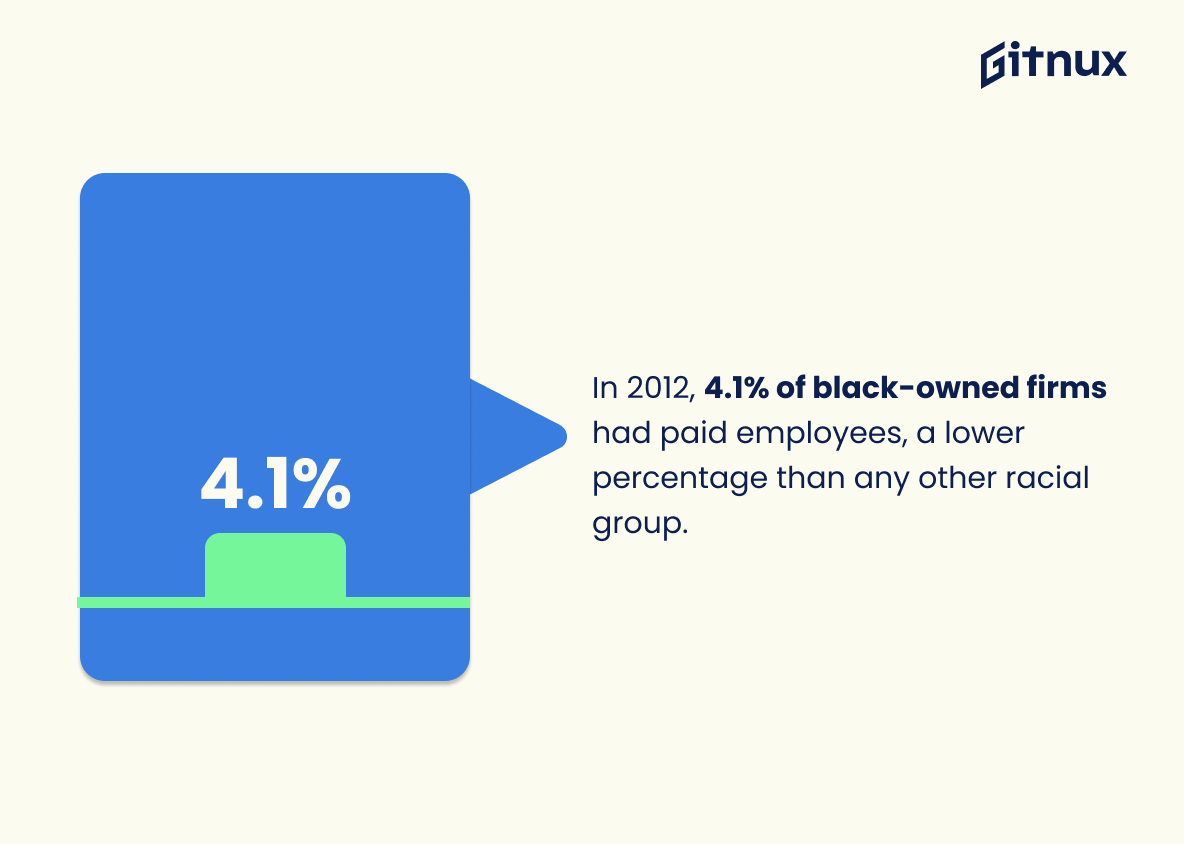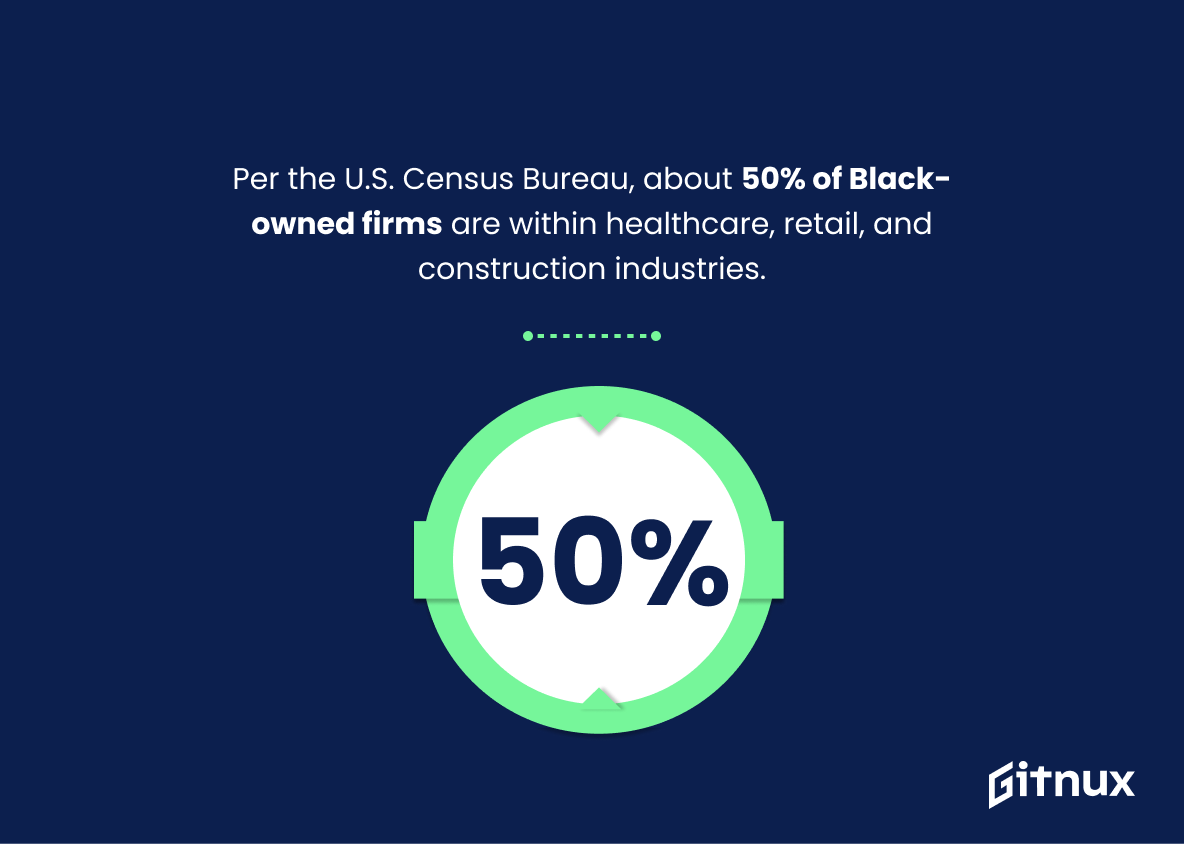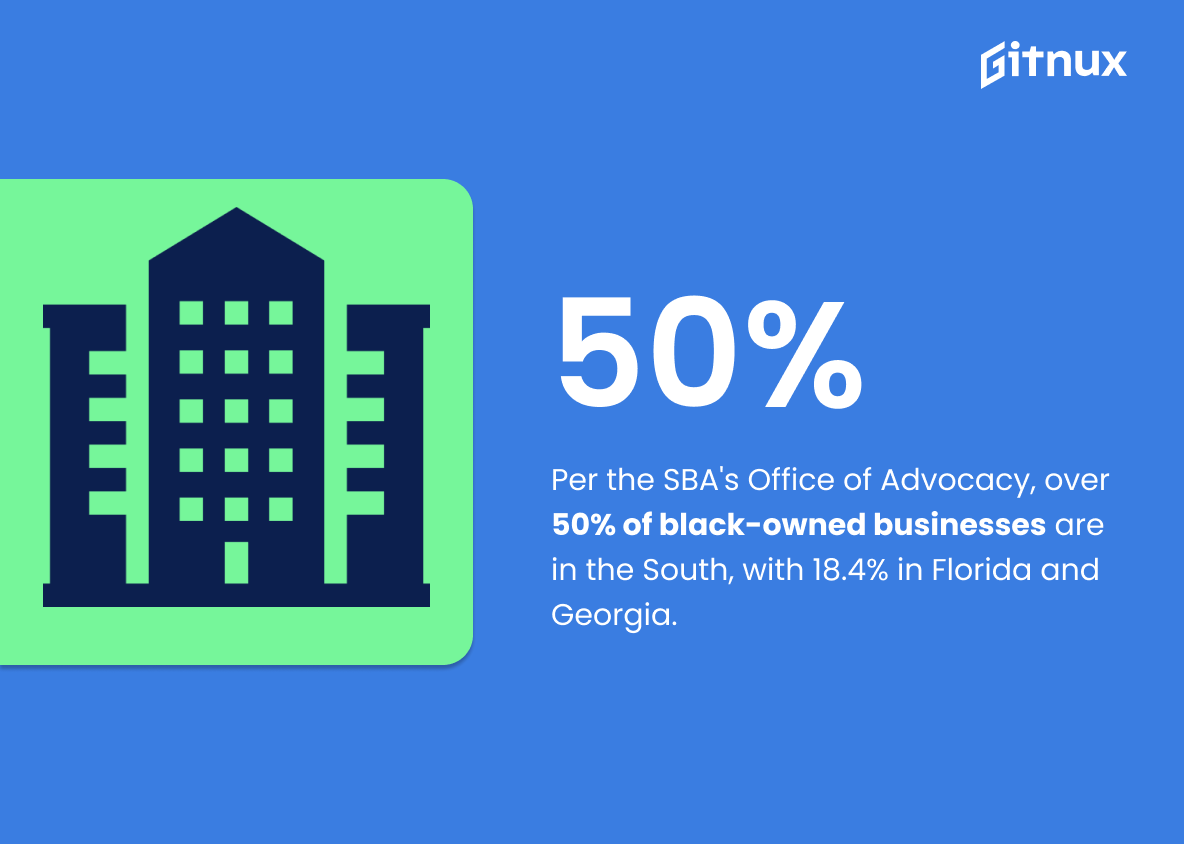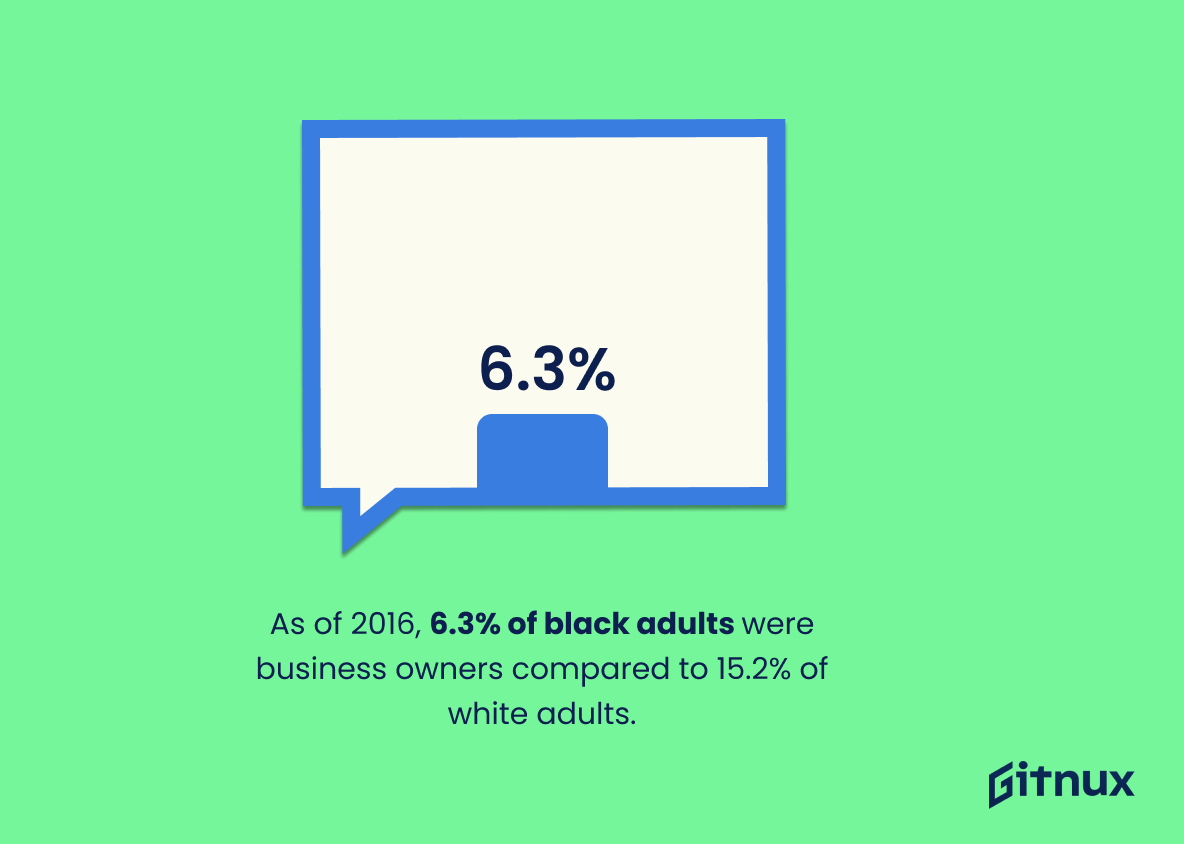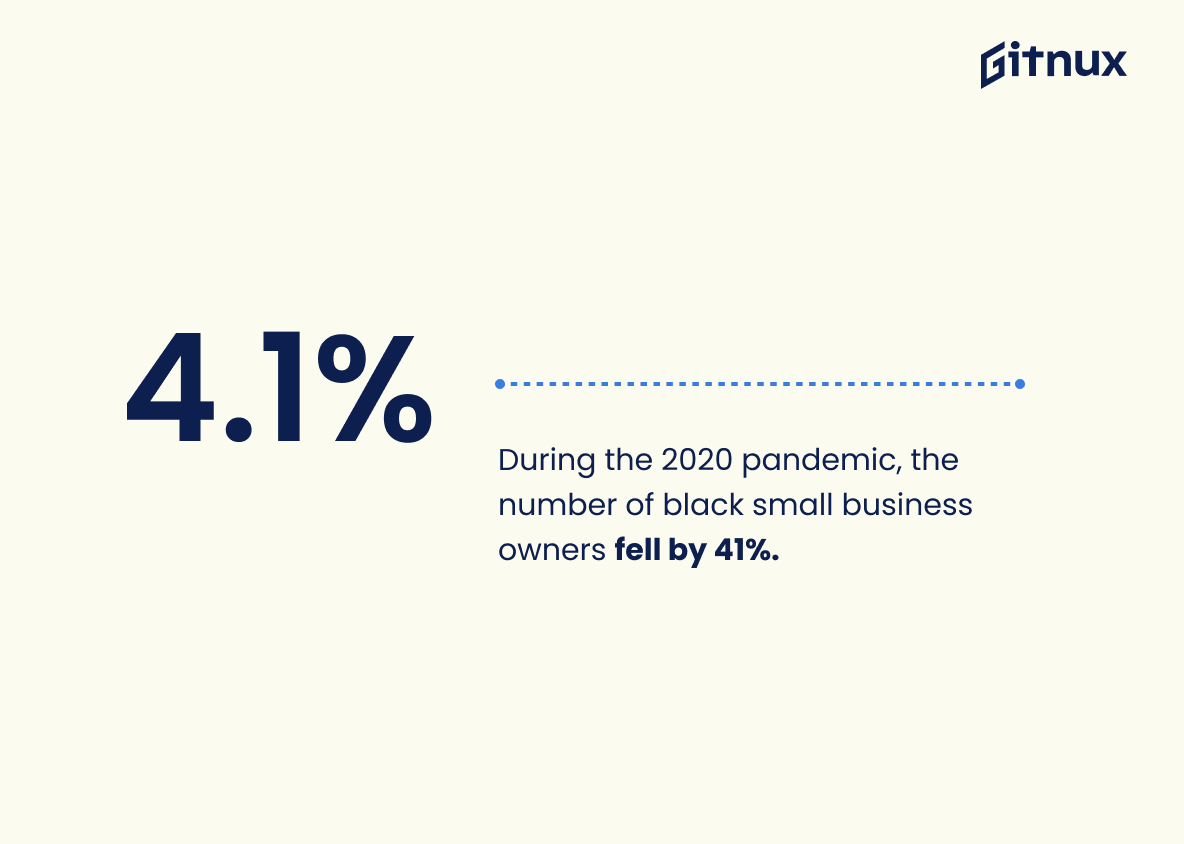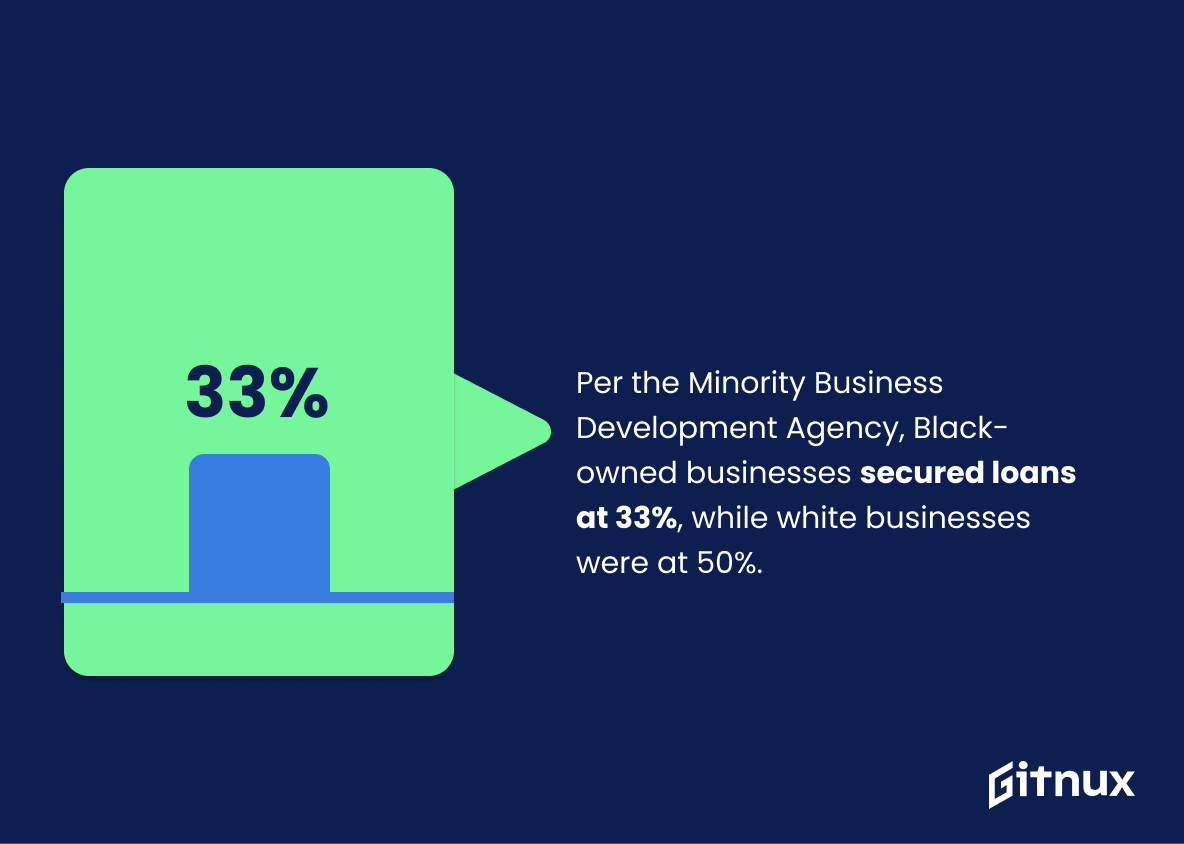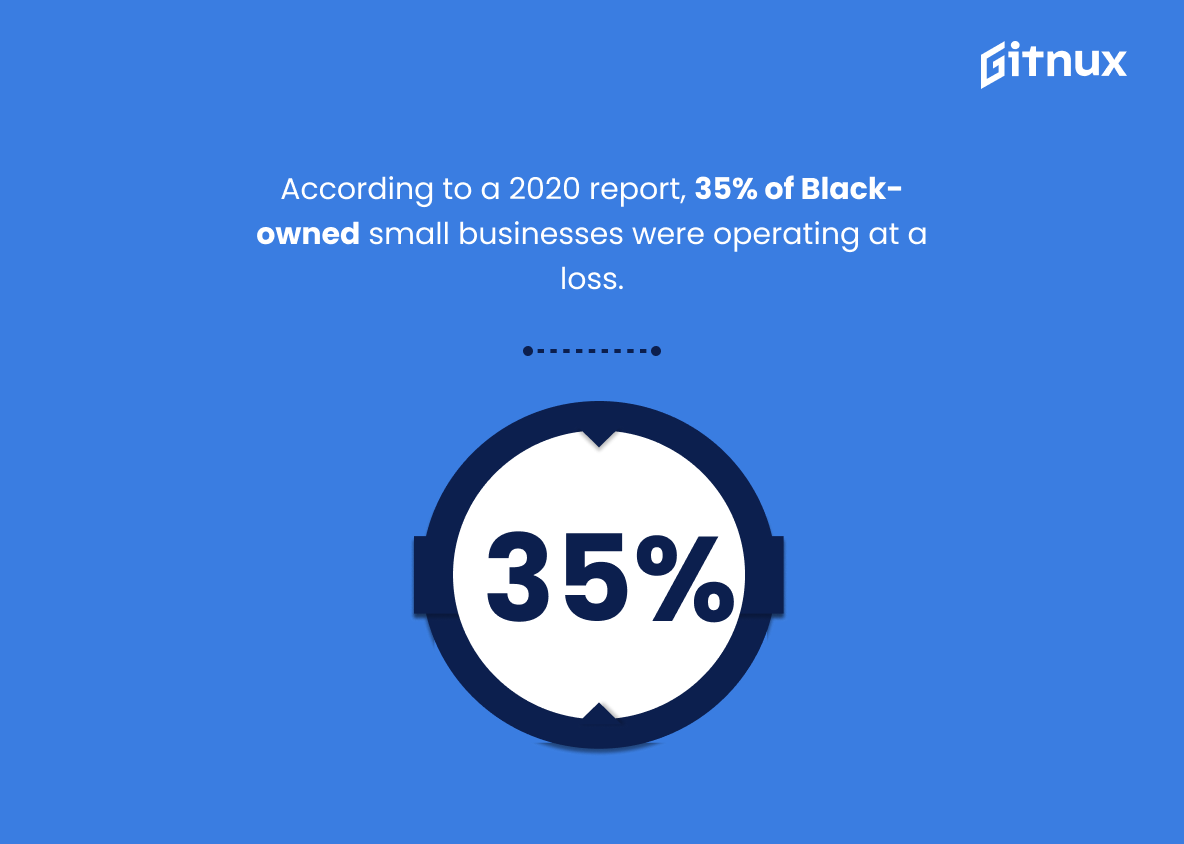In today’s dynamic business environment, diversity and inclusiveness are more relevant than ever. A key player in this paradigm shift is the rise of Black-owned businesses, lending innovative ideas and unique perspectives to various industries. Our following discourse offers an in-depth look into Black Business Ownership Statistics.
The data observed will provide invaluable insights into the growth, challenges, and potential of these businesses, empowering readers with knowledge and raising awareness about the significant role Black entrepreneurs play in our economy. Whether you are an established business owner, budding entrepreneur, investor, or simply a curious reader, join us as we delve into the world of Black-owned businesses through the lens of empirical statistics.
The Latest Black Business Ownership Statistics Unveiled
Black business owners are more likely to struggle financially as 80% earn less than $50,000 a year.
Illuminating the realities faced by Black business owners, the stark figure that 80% earn less than $50,000 a year undeniably underscores the economic disparities that are often hidden beneath the veneer of entrepreneurial success. This statistic not only serves as a sobering reality check, but it also catapults us into the essential conversation of equity in business ownership.
It compels a deeper look into the hurdles faced by Black entrepreneurs, from disproportionate access to capital and credit, to societal barriers and systemic biases. Consequently, it helps to map the landscape of business ownership among the Black community, fueling more effective advocacy, policies, and strategies aimed at leveling the playing field in the realm of business.
According to the U.S. Census Bureau’s Annual Business Survey, there were 124,551 black-owned businesses in the United States in 2017.
This dynamic figure of 124,551 black-owned businesses in the United States, as documented by the U.S. Census Bureau’s Annual Business Survey in 2017, serves as a cornerstone in our understanding of Black entrepreneurship. It paints a vivid picture of economic resilience and increasing diversity in the business landscape.
This numerical testimony underscores the significant presence and contribution of Black entrepreneurs, providing an empirical basis for meaningful discussions around topics of access to capital, wealth disparities, and racial equity. Furthermore, it promotes a narrative of empowerment, progress and achievement amidst historical adversity, making it invaluable in our discourse regarding Black Business Ownership Statistics.
Black-owned businesses only represent 2.2% of the total number of employer businesses.
Diving into the world of Black Business Ownership Statistics, it’s important to spotlight a seemingly small but massively significant number: 2.2%. This figure gauges the pulse of an entire community’s entrepreneurial spirit, illustrating that Black-owned businesses constitute a mere 2.2% of the total number of employer businesses.
This number not only underlines the entrepreneurial journey of African American businesses but also subtly outlines a map of opportunity that remains under-explored. It speaks volumes about the racial disparities in the business world where Black entrepreneurs continue to be a small fraction of the wider commercial landscape. Furthermore, it uncovers layers that demand further research into the factors driving such disproportion, like funding opportunities, systemic bias, and market access.
In essence, the 2.2% isn’t a mere statistic—it’s a magnifying glass onto the state, struggles, and potential of Black business ownership. It’s both an urgent reminder for inclusive growth and a rallying call for aiding the rise of Black entrepreneurs. It embodies the essence of a powerful narrative that celebrates the success of Black-owned businesses, while also acknowledging the long road ahead.
In 2012, 4.1% of black-owned firms had paid employees, a lower percentage than any other racial group.
Examining the statistic that in 2012, a mere 4.1% of black-owned firms had paid employees, paints a stark picture of the challenging landscape for Black business ownership. This figure is not just a number, but a mirror reflecting the complex realities underpinning the entrepreneurial environment for this racial group. The data point bends the spotlight on the disparity when compared to other ethnic groups, thereby reinforcing the critical need for support toward black-owned businesses.
It calls for in-depth exploration into underlying causes and for policy improvements to provide more equitable entrepreneurship opportunities. Furthermore, it emphasizes the importance of understanding the impact such a low percentage of paid employees within black-owned firms could have on broader economic growth and community wealth building. Essentially, these hard facts demand both our attention and action.
Per the U.S. Census Bureau, about 50% of Black-owned firms are within healthcare, retail, and construction industries.
Unveiling the richness of data, the U.S. Census Bureau statistic reveals that approximately half of Black-owned firms reside within the healthcare, retail, and construction industries. This crucial data point illuminates the sectors where Black entrepreneurship thrives, demonstrating a marked foothold in significant parts of U.S. industry. In a broader perspective, this elucidates not only the diversity in Black entrepreneurship but also the vital areas where Black-owned businesses contribute significantly to the economy.
It gives readers meaningful insight into the landscape of Black business ownership and the industry trends shaping it. It’s worth noting such clustering may speak volumes about sector-specific opportunities or systemic factors that influence this trend, thus opening the avenue for deeper conversation about supporting Black-owned businesses in these and other sectors.
According to the Office of Advocacy from the Small Business Administration (SBA), more than half of black-owned businesses are in the South, including 18.4% in Florida and Georgia.
Highlighting the geographic distribution of black-owned businesses presents a critical facet of black business ownership. By illustrating that more than half of these businesses are concentrated in the South, with 18.4% flourishing in Florida and Georgia, this data uncovers significant regional patterns.
This implies that cultural, social, and economic forces align in these areas to foster an environment that supports Black entrepreneurship. Consequently, this insight underlines the necessity of designing approaches or initiatives that consider regional nuances when aiming to bolster the growth of black-owned businesses nationwide.
As of 2016, 6.3% of black adults were business owners compared to 15.2% of white adults.
Diving into the depths of Black Business Ownership statistics, the figure revealing a 6.3% ownership rate among Black adults as of 2016 compared to a 15.2% among their white counterparts unveils an unsettling conversation about the racial gap in entrepreneurship. It serves as a compelling story, shedding light on the uncharted waters of obstacles Black adults must sail through to become business owners.
Not merely a pair of numbers, the statistic beacons an echocardiogram of the economic health of our society, echoing race-related disparities, kindling an essential dialogue on the challenges and hurdles limiting the entrepreneurial spirit in the Black community.
During the 2020 pandemic, the number of black small business owners fell by 41%.
This 41% drop in black small business ownership during the 2020 pandemic paints an alarming picture of the vulnerability faced by these businesses during times of crisis. This bold figure is a crucial thread in the tapestry of Black Business Ownership statistics, shining a harsh spotlight on the challenges persisting for this demographic. Beyond the numbers, it echoes the narratives of resilience, struggle, and continual disparities in paths of success.
Enriched with this understanding, readers can comprehend the gravity of an economic downturn’s impact on the black community and rally behind ways that ensure equivalence and sustainability. The figure serves as a wake-up call for policy-makers, stakeholders, and community leaders to dial up their support and draft strategic roadmap for black small business recovery.
According to the guideline by the Minority Business Development Agency, only 33% of Black-owned businesses obtained loans, compared to 50% for white businesses.
Delving into these numbers, an interesting narrative comes to light, painting a vivid picture of disparity. The Minority Business Development Agency’s guideline indicates that only a third of Black-owned businesses secure loans, standing in contrast to the half of white-owned businesses that do.
In the grand tableau of Black Business Ownership Statistics, this fact serves as a potent reminder of the ongoing challenges faced by Black entrepreneurs in their quest for financial support. It underscores a discrepancy that calls for urgent scrutiny, a gap that’s more than a mere percentage difference, but rather a testament to an unequal playing field.
Essentially, these numbers build a case for introspection within the financial industry, compelling us to challenge the status quo and seek out ways to bridge this chasm. The story they tell stretches beyond business metrics, delving into social justice and equal opportunity, which forms the fulcrum of this blog post.
According to a 2020 report, 35% of Black-owned small businesses were operating at a loss.
Unveiling the realities in the world of black-owned small businesses, the 2020 report’s revelation demonstrates a startling scene: almost one in every three black-owned enterprises is battling fiscal negatives. This critical insight casts a spotlight upon the hardships small black entrepreneurs face and further punctuates their resilience amidst economic adversity.
Shading our understanding of the economic landscape, this statistic uncovers the pain points of black business ownership, creating an imperative for the readers to comprehend the profound urgency for targeted assistance, strategic guidance, and initiatives of support. Strategically woven into a blog post about Black Business Ownership statistics, it compels the audience to reflect on the need for endeavors that would bridge this economic chasm, stimulating conversations on equality, support systems, and policy change.
In 2020, only approximately 20% of Black-owned small businesses were eligible for the Paycheck Protection Program (PPP) loans due to legislative aims.
Highlighted in the realm of Black Business Ownership Statistics, a glaring contrast surfaces in regards to the eligibility for Paycheck Protection Program (PPP) loans. As we journey through the socio-economic landscape of our society, we find that in 2020, only close to one-fifth of Black-owned small businesses found themselves headed towards the doorway of potential relief offered by PPP loans.
This alarming ratio pierces the heart of the discussion on economic opportunity and resource availability. It underscores a prevailing dissonance, fueled by legislative parameters, that hinders the scope of assistance available for these enterprises. Therefore, a reflection upon this data point is critical in bringing significant issues into the spotlight and providing a better understanding of the challenges that Black-owned small businesses face.
In the U.S., there was a 400% increase in Black women starting businesses between 2017 and 2018.
Delving into the riveting narrative of Black business ownership, one cannot sidestep the remarkable surge of entrepreneurial passion sweeping across Black women in the U.S. The unprecedented 400% increase in Black women starting businesses from 2017 to 2018 brings fresh perspectives to the table. It’s a buoyant testament to their unwavering resilience, dismantling stereotypes and societal barriers.
This standout statistic magnifies their contributions to the U.S. economic vitality while elucidating the changing dynamics of the American business landscape towards a more inclusive environment. Furthermore, it amplifies the rippling influence of Black women entrepreneurs, potentially inspiring future generations to forge their own business ventures.
Between 2007 and 2012, veteran black-owned businesses grew by 60%.
In the dynamic tapestry of Black business ownership statistics, certain threads of progress stand out, one of which is the phenomenal 60% surge in veteran black-owned businesses between 2007 and 2012. This statistic injects a wave of optimism in the narrative, highlighting the commendable strides made by black veterans in the world of entrepreneurship. It’s as if we’re seeing the spirit of resilience and tenacity, qualities that are central to a veteran’s ethos, being transferred into the realm of business.
This growth rate not only speaks to the grit and determination of Black entrepreneurs but also implies an increasing support system and resources that bolster the transition from military service to successful business ownership.
Just over half (52%) of all Black-owned businesses are home-based.
Peeking through the curtain into the realm of Black Business Ownership, it becomes apparent that traditions are unmaking themselves. Surprisingly, just over half (52%) of all Black-owned businesses have sprung up and blossomed from the comfort of home, fostering a new entrepreneurial narrative.
In the grand tableau of Black entrepreneurship, this encourages the notion that leaps to success no longer require the conventional office settings but can incubate from homely roots. The highlight on home-based businesses, therefore, not only adds an intriguing touch to understanding the growing versatility within the Black business-ownership sphere, but also illustrates the unwavering resilience and adaptability of Black entrepreneurs to chart their success stories on different plains. It’s a testament to the power of using one’s environment, however unorthodox it may seem, to bring business dreams to life.
58% of Black business owners expect revenue to increase in the year ahead.
Extrapolating from this statistic, one can gleam optimism and a forward-moving momentum within the domain of Black business ownership. The figure, which denotes more than half of Black business owners foreseeing an upsurge in their revenue, illuminates not just the positive economic trajectory, but also a confident countenance in face of future prospects for these enterprises.
In the grand tapestry of Black Business Ownership Statistics, this number stands like a beacon of progress and potential, accentuating a narrative of growth and prosperity. It underscores a robust entrepreneurial spirit and affirms an enriching storyline that can inspire existing and aspiring business owners alike.
According to data by US Census Bureau, black women own roughly 44% of all women-owned businesses.
Highlighting such a robust figure portrays the narrative that Black female entrepreneurship is not just a sideline story, it’s grounds for headlines. This data reveals the impressive level of ambition and resilience in overcoming barriers historically faced by Black women. It also injects a fresh energy into the discourse about the growth and dynamism that Black women bring to the entrepreneurial sphere.
This figure enhances public awareness about the substantial contribution by Black women and underscores the urgency for policies, resources, and support mechanisms that facilitate continued business growth for this demographic.
Approximately 70% of all business owners intend to grow their current business and almost 60% of black business owners express the same intent.
Undoubtedly, the vitality of this statistic surfaces when delving into the world of Black Business Ownership. Across the spectrum of all business owners, 70% harbor intentions of scaling their present ventures. Interestingly, Black business owners are not far behind, with roughly 60% sharing similar ambitions. The nuance here is striking, offering substantive food for thought in our exploration of the dynamics within the Black business community. It subtly underscores the resilience and tenacity inherent in the Black entrepreneurial spirit, as it dares to expand and push boundaries, despite lurking socio-economic challenges.
Furthermore, shedding light on this statistical reality can stimulate conversation around the necessity for more initiatives to support and motivate the growth aspirations of Black businesses. It ultimately serves as a numerical testament to the entrepreneurial vision driving the Black business landscape, and a beacon calling for enhanced support and inclusivity.
According to CB Insights, only 1% of Black business founders receive venture capital funding.
Delving into the heart of Black Business Ownership Statistics, the data point indicating that a meager 1% of Black business founders secure venture capital funding, as delineated by CB Insights, paints a stark picture of the systemic barriers within the entrepreneurship theater. It underscores the gaping disparities in accessing growth fuel such as venture capital, that often serves as a momentum driver for business expansion.
A blog post armed with this insight stands as a beacon, shedding light on the often unspoken, yet crucial narratives within the spectrum of entrepreneurship, thus providing a comprehensive view of the challenges experienced by Black business owners.
As per a report by JPMorgan Chase, Black families are less likely to own a family-owned business than White, Asian, or Hispanic families.
Drawing from the insightful report by JPMorgan Chase, there appears to be an intriguing trend suggestive of a lower prevalence of family-owned businesses amongst Black families in comparison to White, Asian, or Hispanic counterparts. Within the framework of a blog post dedicated to Black Business Ownership Statistics, this fact holds paramount significance, painting a vivid albeit complex canvas.
Dissecting this occurrence could potentially unearth an intricate labyrinth of social, economic, institutional, and even historical factors influencing the terrain of black business ownership. Encapsulated within this numerical testimony could lie inhibiting tales of systemic disparities and challenges, or perhaps overlooked shortcomings in entrepreneurial support structures, both of which warrant urgent attention.
Additionally, this statistic catalyzes a pertinent discussion on actionable routes to foster equity in business ownership. It adds weight to the narrative about the need to level the playing field for Black families, making it a compelling launchpad for exploring solutions such as new policy implementations or resource allocation for black entrepreneurship.
Moreover, it underscores the importance for researchers, policymakers, and stakeholders to continually assess and monitor the landscape of Black-owned businesses to identify trends, understand their implications, and ensure that all communities have an equitable shot at entrepreneurship. This diverse outlook supported by the statistic can, in turn, enhance the blog’s narrative depth, relevance, and reader engagement.
Conclusion
The realm of black business ownership continuously demonstrates vast potential and unequivocal progress. While there are still significant challenges, the rise in numbers and the resilience shown by black entrepreneurs are very promising. Ultimately, encouraging and supporting black-owned businesses can lead to improved economic stability, reduced racial wealth gap, and strengthened communities.
As the statistics depict, the future is ripe with opportunities for black business owners. The key to success lies in creating a more equitable and inclusive entrepreneurial ecosystem that can further empower them.
References
0. – https://www.www.stlouisfed.org
1. – https://www.www.forbes.com
2. – https://www.www.cbinsights.com
3. – https://www.www.nber.org
4. – https://www.www.researchgate.net
5. – https://www.www.jpmorganchase.com
6. – https://www.www.census.gov
7. – https://www.www.mbda.gov
8. – https://www.www.guidantfinancial.com
9. – https://www.www.trade.gov
10. – https://www.www.score.org
11. – https://www.www.smallbizgenius.net
12. – https://www.www.google.com
